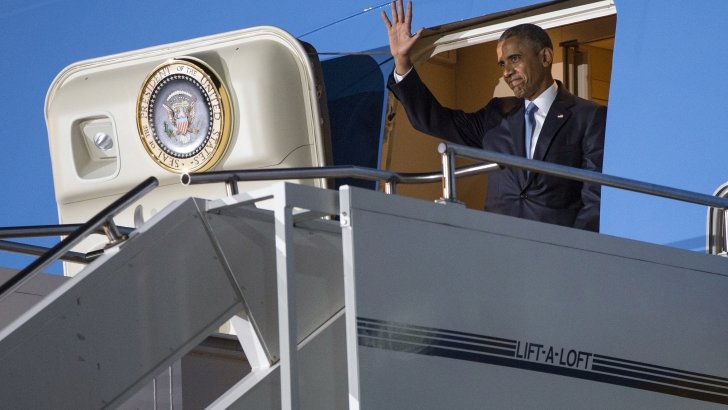Scourge of terror in East and Horn of Africa will largely inform Obama’s visit

NAIROBI IS IN LOCK-DOWN and the East African airspace temporarily off limits for airlines as US president Barack Obama lands in Nairobi for the Global Entrepreneurship Summit and later to Ethiopia before concluding his African tour.
This will be Obama’s second tour to the East African region following the 2013 visit to Tanzania in an itinerary which included Ghana and Senegal.
The Global Entrepreneurship Summit which will be the first one in Sub Saharan Africa has attracted dozens of American companies and will be a great opportunity for local companies in the region to network and possibly establish working partnerships.
Kenya’s president Uhuru Kenyatta has indicated he will hold talks with Obama on trade between the two countries noting that the US is a leading partner in trade, accounting for more than $3 billion worth of business every year.
But the coming of Obama will not be confined to the GES agenda. Kenyatta said he will also discuss the war on terror in the region particularly with regard to the scourge of Al-Shabaab largely based in Somalia.
This view is further exemplified by the fact that Obama is being accompanied by national security advisor Ms Susan Rice — who will spearhead discussions on security — and Commerce Secretary Penny Pritzker.
White House officials however say Obama’s primary focus in Kenya and Ethiopia will be on trade, economic growth and the evolution of US-African relations.
Counter-Terrorism
On the regional front, Obama is confronted with a region faced with terrorism and rise of extremism which is not only a security challenge to the region but also a headache to US interests in East and Horn of Africa.
The last one week has seen ratcheted military offensives by the Somali National Army, SNA backed by the AU force, AMISOM. From the sky, US drones have been bombing Al-Shabaab targets and providing intelligence and cover for AMISOM/SNA forces.
“The offensives have seen the fall of Al-shabaab strongholds including Jungal and Bardhere in Gedo region and the latest, Dinsoor in Bay region bordering Kenya. Several Al-Shabaab leaders have been killed in the past few weeks in what AMISOM dubbed ‘Operation Jubba Corridor’.
Obama will likely seek to reinforce the capacity of AMISOM as it marks 8 years in Somalia. The State Department notes that United States has committed to provide more than $512 million to provide support to the AU Mission in Somalia (AMISOM) to build capacity to counter al-Shabaab in Somalia and provide space for political progress.This includes pre-deployment training, provision of military equipment, and advisors on the ground. Additionally, the United States has provided more than $455 million in U.S contributions for the UN Support Office for AMISOM (UNSOA), thereby bolstering support to African Union forces.
The AMISOM mandate runs out in December 2017 following a UN resolution to extend the mission. Focus is not only on AMISOM but the reinforcement of the Somali National Army and the security sector in general as Somalia gradually emerges from many years of collapse of public and private sector, thanks to over two decades protracted conflict.
Analysts find Obama’s visit strategic as Washington seeks to assure Nairobi of its support even as Kenyan troops continue to battle Al-shabaab in Somalia. “Kenya has borne the brunt of Al-Shabaab more than any other troops contributing country to AMISOM,” says Abdihakim Ainte, a consultant with the Mogadishu based think tank on transitional challenges and governance, Trans-Link Advisory. Obama will seek to impress upon Uhuru Kenyatta that despite the numerous attacks on Kenya’s soil, the US is standing with them. The talks will look at ways of strengthening Kenya Defence Forces through funding, training and intelligence sharing particularly for homeland security,” notes Ainte.
American footprints
The surprise visit by Secretary of State John Kerry in May to Mogadishu was a pointer to US return to Somalia and the appointment of Katherine Dhanani as ambassador to Somalia, though she withdrew her candidacy further signaled American footprints in Somalia could be in the offing.
Though Obama will not be meeting with Somali president Hassan Sheikh Mohamud, the US is keenly following political developments in the country. “Somali power-sharing would require “respect for the need for a national government, but also respect for the authorities of the states” to provide Somalis with security,” said Kerry during his visit to Somalia.
Somalia is going to the polls in September 2016 upon approval of the provisional constitution in March.
By Tomno Dominic